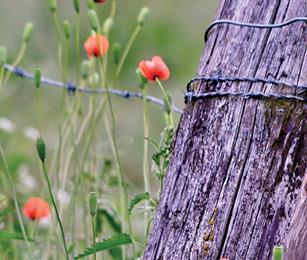
I’ve come across people who think everything happens for a reason and others who think that’s an outrageous thing to say. I’ve noticed an emerging pattern in my own life of what I call ‘God’s agendas’ — a surprising unfolding of events running alongside what I expected to happen.
For example, when I went to university aged 19, I knew I’d be studying English literature, but never expected the most vivid and abiding focus of those years would be discovering community and learning about monasticism. That was a God agenda added in, a surprise and delight. So often things don’t turn out as we had imagined. And everything changes.
There’s a saying, “The flower is in the compost and the compost is in the flower”. It’s a comment on the impermanence of life and circumstances, and a wise observation that everything holds somewhere the seed of its opposite.
Beautiful flowers wither and die, and turn to compost, but out of that compost new flowers can grow. When we look back we can often see, without that terrible bereavement, that crushing failure, that bitter disappointment, this new opportunity or friendship would never have arisen. Life has its seasons, and there are so many turnings in the road.
It’s also a dark and beautiful truth that those things we most value — courage, faith, hope, kindness, goodness, sacrifice — are fruits growing from hard and bitter roots. It is in the prison camp or the hospice that we see shining most brightly those qualities we believe make life worth living. Lotuses grow in mud.
Even so, I don’t believe we are meant to passively accept everything that happens to us. The wise writer Eckhart Tolle suggested three options could make sense as a response to our life circumstances: celebrate, accept, or change.
I think he’s right. If now is a good season, everything going well, we can treasure these times and celebrate, not take it for granted. If things are hard and miserable, we shouldn’t complain and put up with it, but make whatever changes we can. If there are some things we cannot change, then learning to accept our present reality will bring a measure of peace; learning to be, as St Paul said, content in all circumstances.
I don’t think God sends suffering as a test or punishment, but he is there inside the problem, and we can trust him to lead us through.
What are your current circumstances?
A cause for celebration
What is there you would like to celebrate right now in your life? I’ve know people even in terminal illness say, “This has been the best time in my life,” because they found their way to love and truth. There is always something worth celebrating. What can you identify that you’d like to celebrate today?
A challenge to accept
What do you feel you personally must work on accepting at the present time? Is there a disability, a family problem or some hard situation you cannot leave? Could you make a quiet moment to ask God to help you accept this difficult reality, and show you anything you can learn through these challenges?
A need to change
A young burglar in prison said, “I was doing fine until this happened”. But his life couldn’t improve until he realised making different choices would create change. What do you need to find the courage to change in your life right now? And remember — you can be a kind, goodhearted person and still say “No”.
- Penelope Wilcock is an author based in East Sussex. Connect with her at kindredofthequietway.blogspot.com






























